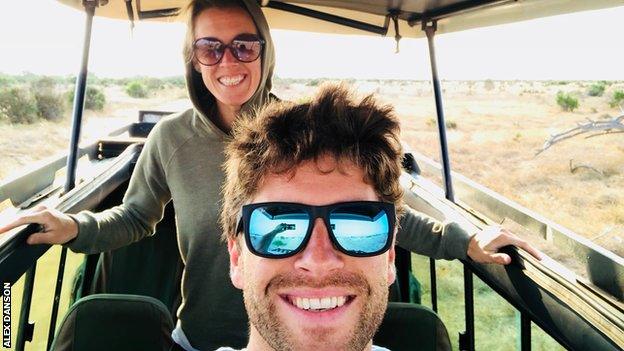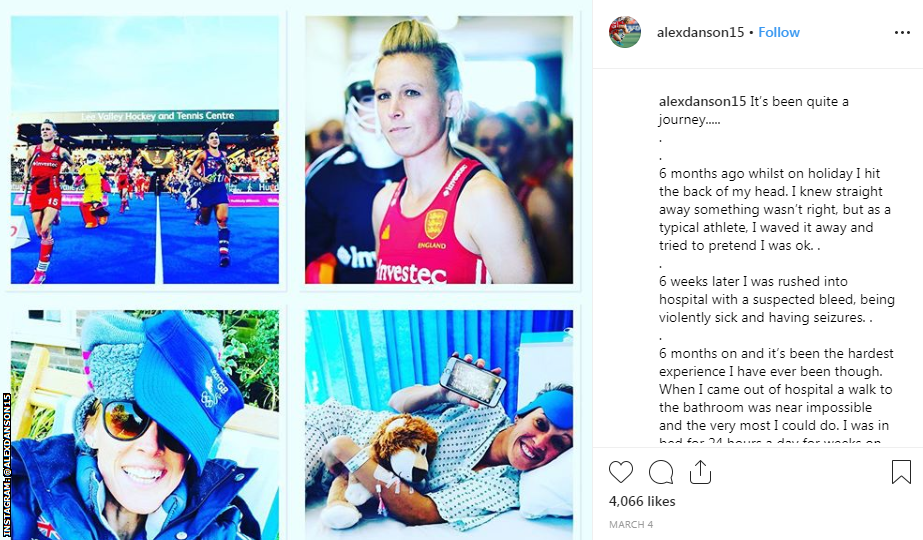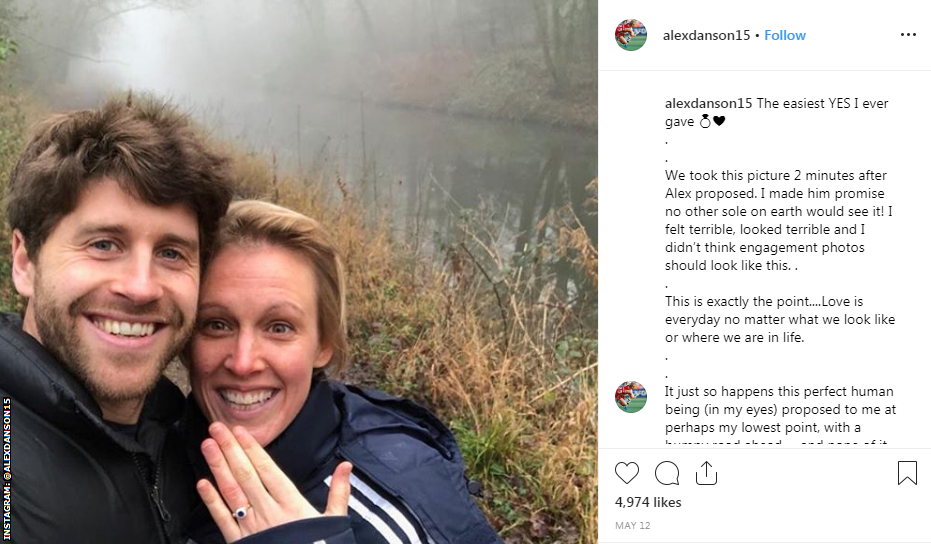Alex Danson: England captain and Olympic champion on head injury recovery
- Published
Recovering from head injury has been my biggest challenge - Danson
Nine months ago, Alex Danson laughed at a joke made by her boyfriend.
It was a seemingly insignificant moment, something that happens often in a relationship.
But for Danson it led to what she describes as the "most challenging part" of her life.
Two years on from winning Olympic hockey gold with her Great Britain team-mates, Danson was on holiday with her now fiance Alex.
He, she says, is "really not that funny". This time he was, and when she threw her head back to laugh, it hit a concrete wall.
The impact gave her what she describes as a mild traumatic brain injury. She has not yet fully recovered.
"It was hard but equally it wasn't a car crash," the 34-year-old tells BBC Breakfast's Sally Nugent. "I didn't fall from a great height. There was no seemingly huge trauma at the time but I knew something wasn't right.
"I remember getting back to the apartment that night and I woke up every hour. I'm an athlete. We spend our life pretending we're fine because you want to compete. We did lots of things wrong. The next day we went running.
"We were on holiday for another couple of days and getting home was a nightmare. I was very unwell. I had my hands on my head at the airport, I was crying.
"By the time I got home, I wasn't well. I had terrible headaches, light sensitivity, noise. I came back and I was in bed in a dark room for a month."

Danson was on holiday in Kenya with her fiance Alex when she hit her head
'I lost the ability to speak'
Danson had captained England at a home World Cup shortly before her holiday in Kenya.
Six weeks after coming home, she joined her team-mates on an away day - doing nothing more strenuous than pottery painting.
"I persuaded the doctor that I'd be able to go," she says. "I went for an hour and all I remember was talking to my team-mate next to me and I lost the ability to speak. I just couldn't say any words.
"Obviously I was frightened but I didn't want to cause a scene so I went back to painting my egg cup. I went home as soon as that session was done.
"I was very sick. I don't remember much. I went to hospital, I was very unwell."
'Noise can make me feel unwell'
When Danson left hospital "sometime later" she was excited, thinking it meant she was better.
But even the journey home was a challenge - Danson made her dad drive slowly, and describes going over bumps as "horrendous".
"That is when the hardest part of this began," she says. "The realisation that head injuries can take time. You have to be aware of that.
"The next few months were really challenging. I was in bed 24 hours a day. I could hardly walk to the bathroom.
"I couldn't bear light, sound, touch, anything. It was almost like my sensory dials had been whacked up. Even holding a conversation, I'd have to talk very slowly.
"I've improved hugely and headaches are my predominant problem. Light is still quite bright and noise can make me feel unwell."

Danson told her Instagram followers about the injury in March
'In sickness and in health'
Things are getting better for Danson, but she says she could not have got this far without the support of her family and fiance.
"If you have a head injury there is one person that physically goes through it, but anyone you speak to who's had a head injury would say they're not the only person whose life it affects," she says.
"Their lives overnight were different. When I was still unwell, Alex proposed. He just said, in sickness and in health, he wasn't going anywhere.
"Now I see the magnitude of what he did and the timing in which he did it. It was back in December. We told friends and family who visited us regularly.
"We said then we'd get married in September. We were still saying every week that I'd be better next week. September's coming round and we're not going to change our plans.
"I still believe by September hopefully I'll be 100% better and we'll enjoy our wedding day fully. If not, we'll just alter a little bit."

Danson got engaged in December
'I can feel your hugs'
More recently, Danson has returned to GB Hockey's training base once a week to spend time with her team-mates.
Helping them understand what she is going through is challenging, so Danson wrote them a letter.
She says: "I said things like: 'Short conversations for me are good. Flood me with positivity. Speak to me about positive things because negative things at the moment for whatever reason, my brain can't process. I can feel your hugs, I can converse but the reality is I have an invisible illness that means I'm not able to live to my capacity.'
"It was making them aware of some of my symptoms and asking for their help in saying: 'Please trust me that I will tell you when I'm better.' I will tell the world when I'm 100% because there will be no stopping me."
'I'm told I'll make a full recovery and I absolutely believe that'
As well as her team-mates, Danson wants others with head injuries to learn from her experience.
"I underreported and I learned the hard way," she says. "If this helps people who have it to be honest about what you're feeling and what you're going through... we'll have days when it's relentless and you think it won't go, but underneath just believe it will."
That belief is one thing Danson has.
"I'm doing everything in my power to be positive and behave as though I'm going to get better," she says. "I'm not playing my sport, I'm nowhere near physically able to do that yet.
"I'm still the same person. I'm still incredibly competitive. I've had the most amazing career. I never thought it would be taken away so abruptly. I still hope to return.
"I'm told I'll make a full recovery and I absolutely believe that."
BBC Sport has launched #ChangeTheGame this summer to showcase female athletes in a way they never have been before. Through more live women's sport available to watch across the BBC this summer, complemented by our journalism, we are aiming to turn up the volume on women's sport and alter perceptions. Find out more here.